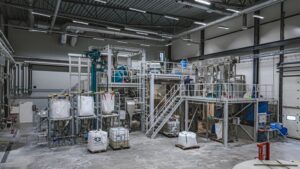The Novo Nordisk Foundation has granted CIMMYT up to USD $21.1 million for an initiative aimed at developing new wheat varieties that can reduce agriculture’s nitrogen footprint. Known as the CropSustaiN initiative, this holds promise for enhancing global food security and environmental sustainability.
To address a rising global population and the role of fertilizers in boosting agricultural output, a new research initiative aims to shrink the nitrogen footprint of agriculture by developing a new technology based on nature’s own solutions: a natural process called biological nitrification inhibition (BNI), according to a press release. The Novo Nordisk Foundation has awarded CIMMYT a grant of up to USD 21.1 million to lead an innovation research initiative called CropSustaiN that is designed to reduce the nitrogen footprint of wheat cultivation.
Bram Govaerts, Director General, CIMMYT, said that BNI could be a part of how we revolutionise nitrogen management in agriculture.
“It represents a genetic mitigation strategy that not only complement existing methods but also has the potential to decrease the need for synthetic fertilisers substantially. The mitigation potential of better nitrogen fertiliser management could be as impactful for the Global South as the Green Revolution.”
Revolutionary Mitigation Approach
Based on seed-based genetics, BNI uses natural plant processes to inhibit soil nitrification through organic compound release. This method aims to lessen dependence on synthetic nitrogen fertilizers, which contribute significantly to greenhouse gas emissions and water pollution. Crucially, BNI seeks to achieve these benefits while maintaining wheat yield and soil health. Unlike synthetic nitrification inhibitors, BNI offers a scalable and cost-effective solution, potentially reducing nitrogen fertilizer use by up to 20%, depending on local farming conditions.
CropSustaiN uses seed technology advancements to harness BNI, a natural process, in developing new wheat varieties needing less nitrogen fertilizer. By integrating genes from nitrogen-efficient wild crop relatives like wild rye via conventional breeding, CIMMYT aims to globally distribute these advancements for agricultural benefit.
The agenda for CropSustaiN includes validating BNI effectiveness across diverse climates and integrating the technology into mainstream agricultural practices. By ensuring accessibility of these seeds to all farmers without exclusive patent rights, the Novo Nordisk Foundation promotes an inclusive approach to agricultural innovation.
CropSustaiN builds on joint research initiated in 2015 by the Japan International Research Center for Agricultural Sciences (JIRCAS) and CIMMYT. Already tested over three farming seasons, the BNI wheat lines developed through this initiative are now ready for further refinement and global scaling, potentially signaling a transformative shift in agricultural methodologies.
The Novo Nordisk Foundation has already laid the groundwork for CropSustaiN by funding related BNI research at CIMMYT, the International Crops Research Institute for the Semi-Arid Tropics (ICRISAT), Aarhus University, the University of Aberdeen, and the University of Copenhagen -thus fostering an ecosystem for research innovation.













